8 WAYS THE FITNESS SUPPLEMENT
INDUSTRY IS RIPPING YOU OFF
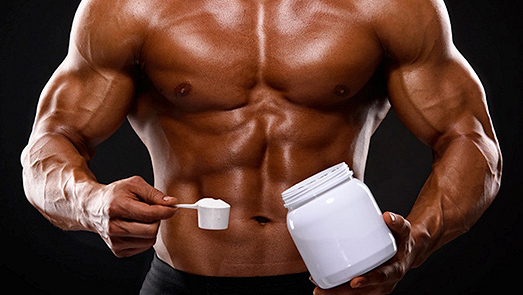
Anyone who regularly follows my content knows that I’m hugely critical of the bodybuilding and fitness supplement industry.
I’ve been weight training consistently for over 15 years now, and while I don’t regret all those hours spent in the gym and the solid nutritional habits I’ve cultivated over that time, the one thing I do regret is the huge amount of money I wasted on so-called “muscle building” and “fat burning” supplements that didn’t truly work.
I was too naive back then to realize just how misleading the majority of the industry really was, and the various ways that it preys on the insecurity and gullibility of those trying to get into better shape and improve their health and fitness.
Yes, the right supplements in the proper dosages can certainly provide a worthwhile boost to your training performance, however, the “good ones” are extremely few and far between.
The simple fact is that most of the items lining the shelves at your local supplement store (probably 90-95%) are quite simply NOT worth your hard-earned money and will do very little (if anything) when it comes to helping you build muscle and lose more fat more effectively.
Dietary supplements are a 37-billion-dollar-a-year business in the U.S alone, and here are 8 different ways these companies are trying to take advantage of you that you should definitely be aware of…
Supplement Ripoff #1: Ineffective Ingredients
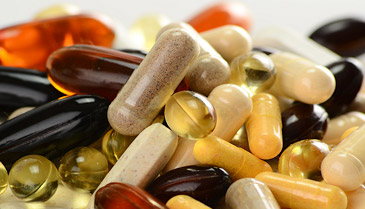
Despite the endless list of different supplement compounds that are commonly claimed to build muscle, burn fat and improve performance, the truth is that only a very small percentage are truly supported by legitimate scientific research in this area.
The rest are based entirely on false promises and misleading claims that leave you with nothing but a thinner wallet and a minor placebo effect at best.
In the world of supplementation, marketing is everything.
Take some obscure ingredient, hype it up as the “next big thing”, support it with some seemingly convincing yet misleading “research”, and watch the sales come pouring in.
Don’t fall for this idea that all the fancy looking bottles at your local supplement store were formulated by an educated group of “supplement scientists” walking around in white lab coats, carefully analyzing every ingredient, dosage and combination based on stacks of in-depth supplement research studies.
In reality, the majority of what’s out there is actually created by fitness marketers.
Fitness marketers who simply mash together a nice-sounding list of recognizable ingredients, slap on a flashy label, create a hyped up advertising campaign and then toss it onto the shelves and into the online stores.
The supplement industry is only very loosely regulated by the FDA, and anyone out there with some money and a business idea can easily formulate and sell their own products without any real restrictions. In reality, you’d be better off finding supplements that you know have natural ingredients and can’t do you any harm, such as many CBD products. Since the emergence of the CBD industry, many businesses have figured out how to sell cbd products that are both very profitable and very effective for the consumer, unlike many supplements that are blindly purchased by so many people.
Here are just a few examples of popular supplements that are heavily promoted for their supposed fitness benefits yet have been directly shown in research to be ineffective for improving body composition and training performance:
- BCAA’s
- Testosterone boosters
- Growth hormone releasers
- L-Glutamine
- “Advanced” forms of creatine
- CLA
- HMB
- Myostatin blockers
- Nitric oxide boosters
- SARMS
- Methoxy
- Ecdysterone
- Green coffee bean
- Raspberry ketones
- Garcinia Cambogia
Supplement Ripoff #2: Excessive Hype
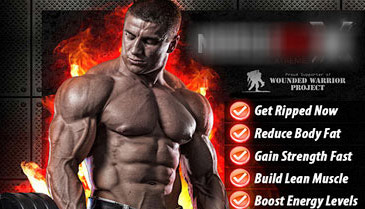
Not only is the list of legitimate, research-supported supplements available a very short one relative to the thousands of different products being sold nowadays, but it’s also important to keep in mind that even those few supplements that do work are by no means a replacement for proper training and nutrition.
Sure, I like the idea of popping back a few pills and seeing a huge instant boost in muscle growth and fat loss over night just as much as the next guy, but it just doesn’t work that way in real life, no matter what that supplement ad with the photo-shopped fitness model on it told you.
Always remember…
Supplements are just that: supplements. They are supplemental to your program and are only intended to provide a moderate boost to your overall results.
What specific benefits can supplements provide?
First, they can improve the efficiency of your eating plan by helping you meet your daily nutritional needs in a more streamlined way. Protein powders are the most popular go to choice in this area, providing an easier means of hitting your total protein requirements in comparison to getting it all from solid foods only.
Secondly, supplements can provide concentrated doses of certain muscle building, fat burning and health promoting compounds that are difficult (or even impossible) to obtain in optimal amounts from regular whole foods.
For example, you’d need to eat around one pound of red meat to obtain a standard 5 gram dose of creatine, whereas a creatine supplement can provide that same amount in one small teaspoon. Those who train hard in the gym multiple days per week also tend to be low on certain micronutrients that are drained from the body through intense exercise, such as magnesium and zinc. These are just a few examples of many.
Thirdly, they can help to improve the quality of your workouts when taken directly prior to training sessions.
Although most typical commercial “pre-workout blends” on the market are poorly formulated and excessively over-priced, there are a few research-backed compounds available that can provide a useful edge in terms of increasing strength, energy and mental focus in the gym when consumed in the proper forms and doses.
So yes, if your goal is to fully optimize your results over the shortest period of time and with the greatest level of convenience, a few evidence-based supplements can certainly have their place in rounding out your overall fitness plan.
Just don’t expect them to work any miracles, and remember that consistent proper training and nutrition is where the majority of your results will be derived from no matter what.
Supplement Ripoff #3: Price

Not only are you being sold a flat-out ineffective product far more often than not, but you’ll usually be paying a decently high price for it as well.
It’d be one thing to spend 5 or 10 bucks on something that didn’t work, but in most cases you’ll be dishing out 20, 30, 50 dollars or more per month, which can add up quite a bit over the long term especially considering that most trainees will be using multiple supplements at any given time.
The markups on most popular fitness supplements are absolutely through the roof, with companies often paying just a few bucks to produce each bottle and then selling it for 10 times the cost.
Supplement Ripoff #4: Label Fraud
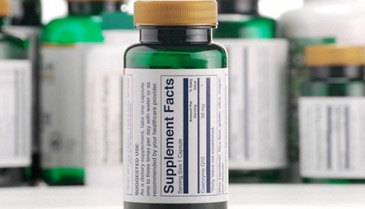
I can’t even count the number of cases that have popped up over the years where popular supplements have been found to just straight up not contain what the label says they do.
One recent example involved the mega vitamin retailer GNC, along with Target, Walmart and Walgreens, where it was uncovered that only 20% of their top-selling herbal products actually contained the herbs listed on the label, with cheap fillers like rice flour and asparagus making up the rest.
Amino spiking has become another huge issue in the protein powder category where many companies have been routinely adding cheap free form amino acids into their blends (such as l-taurine, l-glycine or l-methionine) as a way of cutting costs and artificially raising the protein count.
For labeling purposes, the protein gram amount listed on the product is based on the total nitrogen content, so even though these isolated amino acids are technically not complete proteins, they’ll still contribute to the total.
An amino spiked powder might list “25 grams of protein per scoop” on the back, when in reality up to half of that could just be cheap, ineffective fillers that have no real benefits at all.
The bottom line here is that just because something is listed on a supplement label doesn’t even necessarily mean that that’s what you’re truly getting.
And if some of the biggest, most popular supplement companies out there are getting away with false labeling tactics like this, you can only imagine how prevalent it must be with smaller brands as well.
Supplement Ripoff #5: Proprietary Blends
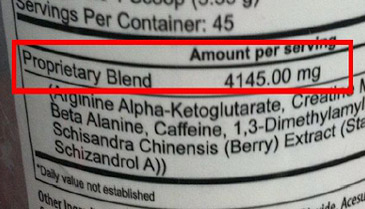
This is a huge one and is among the most commonly used “ripoff” techniques in the entire fitness supplement industry.
A proprietary blend is where the label provides a list of all the ingredients that are included in the product along with the total amount for all of those ingredients combined, but NOT the specific amount of each individual ingredient.
No, this has nothing to do with the company’s desire to hide their “top secret formula” from competitors so that it can’t be copied (this is what a proprietary blend is theoretically supposed to be used for)…
In virtually all cases, proprietary blends are nothing more than a misleading labeling tactic used to intentionally under-dose products and save on costs.
By using a proprietary blend, the company can list off a bunch of recognizable ingredients that sound good on paper, but then only sprinkle in a small amount of some or all of them in order to increase their profits.
Since they know that the average consumer doesn’t actually understand proper supplement dosing and is simply responding to the marketing, they can easily get away with this and make more money in the overall picture as a result.
For example, a particular product might list off a 5 gram proprietary blend of creatine monohydrate, beta alanine, citrulline malate and LCLT.
However, if you know what the proper research-backed dosage is for each individual ingredient (3-5 grams for creatine, 3-6 grams for beta alanine, 6-8 grams for citrulline malate and 1-2 grams for LCLT), you can clearly see that it’s impossible for the blend to contain the right amount of each one.
When it comes to muscle building and fat loss supplementation, dosing is critical.
Simply consuming a particular research-supported ingredient on its own is not enough – it must also be consumed in the proper study-validated dose if you want to see real benefits.
Bottom line?
If a company isn’t willing to show you exactly what’s in their product including all the ingredients and the precise dosages for each, they’re almost certainly hiding something and you’ll be best off to steer clear.
Supplement Ripoff #6: Banned Substances
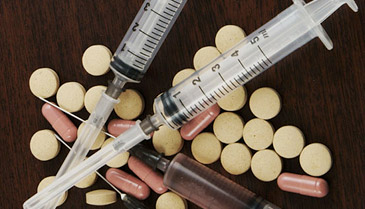
Aside from supplements being frequently under-dosed and mislabeled, some companies have even gone as far as mixing certain banned substances into their formulas to increase their effectiveness.
You can run an online search to see a list of cases that have popped up over the years, including instances of amphetamines, steroid compounds and other dangerous stimulants being illegally added to various popular products.
These sorts of cases are fairly rare overall, but it’s just another reason to be cautious when making supplement buying decisions, especially if you’re a competitive athlete who undergoes drug testing.
Supplement Ripoff #7: Fake Before/Afters And Endorsements
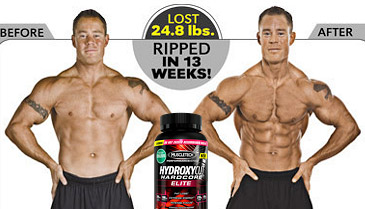
You’ll see this all the time in supplement ads or on social media platforms like Facebook or Instagram…
A guy or girl with a ripped physique standing next to a bottle of pills, a tub of powder or a box of tea saying something like, “I used product X to lose 25 pounds of fat and get six pack abs fast!”
Unfortunately, paid product placements with these sorts of over-the-top claims are nothing more than a marketing gimmick designed to hype up a given supplement and get people to fork over their cash.
First off, keep in mind that there’s a decent chance the person in the ad doesn’t even use the particular product they’re posing with and that they’re only promoting it to their followers because of the financial compensation they’ve received.
Supplement companies routinely reach out to those on social media with decently sized fitness followings and offer them money to promote their brand as a simple means of paid advertising.
Secondly, a lot of the pictures you see on these platforms aren’t even truly “real” to begin with.
Whether they’ve been touched up to appear more impressive or have been blatantly modified using Photoshop, it’s almost impossible to know nowadays which pictures are legit and which ones are fake.
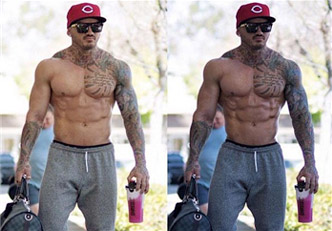
The use of varying angles, lighting effects and flexing techniques can also make before/after transformations seem much more dramatic than they really are.
Lastly, let’s also not forget the fact that many of the popular bodybuilding and fitness figures you see online aren’t even natural athletes to begin with and have additional “chemical assistance” on their side, in which case a natural trainee shouldn’t even begin to compare themselves to that person in the first place.
Supplement Ripoff #8: Low Quality Manufacturing
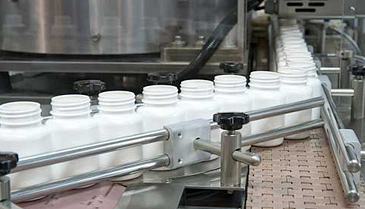
Even in the rare case that a particular supplement does overcome all of the previous obstacles we just outlined, you still have to consider the issue of underlying product quality.
Most people are under the impression that every supplement company runs its own manufacturing facility and personally develops all of its products firsthand, when in reality almost all of them outsource the production of their formulas to third party contract manufacturers.
There is nothing inherently wrong with this (it’s common practice in many other industries as well), but it can become a legitimate problem when lower grade manufacturers are selected as a way of further decreasing production costs.
For example, are you receiving pure raw ingredients from verified high quality sources, or cheaper alternatives from overseas? Are your supplements being made in a cGMP/NSF certified facility, or one that uses unregulated, cheaper processing methods? Are the products third party tested? Are they free of harmful contaminants?
When supplement companies opt for inferior quality processing in the interest of greater profits, it’s like playing Russian roulette with your body. You’ll never know if the end product you’re getting is truly effective, or even worse, if it’s safe for you to consume.

Everything we’ve covered so far has no doubt painted a fairly negative picture of the supplement industry as a whole, but it’s very important that these various warnings be taken seriously – otherwise, you could easily end up wasting a ton of unnecessary money, time and effort in this area of your program trying to sift through what works and what doesn’t.
I’m by no means against the use of supplements, but it has to be done properly if you truly want to see measurable benefits and get the most bang for your buck. It requires the use of science-based ingredients that are truly backed by reliable research, taken in the proper dosages and combinations, and using products that are safe, transparently labeled and cost-effective.
The challenge is that, with the endless selection of different supplements available all promising superior results over the next one, trying to separate fact from fiction within this multibillion dollar industry can be a pretty daunting task.
If you’re fed up with the hype and exaggerations of the supplement industry and are looking for a few basic, affordable, scientifically supported formulas that genuinely can assist you with your muscle building and fat burning efforts, stay tuned for another email tomorrow you won’t want to miss.
Talk soon,
![]()


